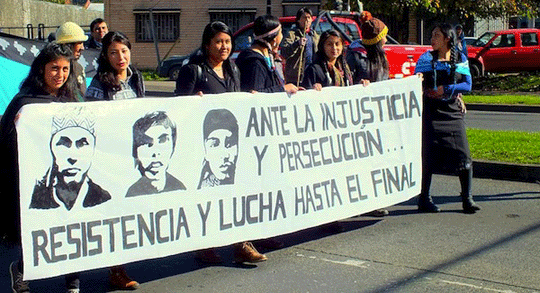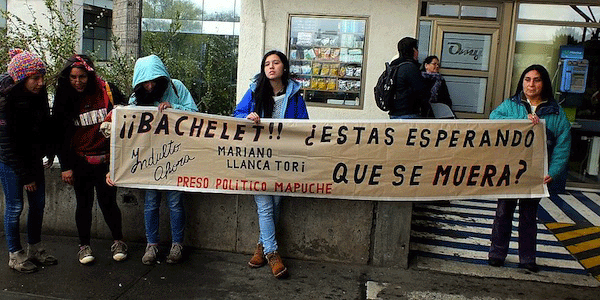



By Charlotte Karrlsson-Willis
Published On : Thu, May 8th, 2014

Mapuche protesters hold banner with mages of the three men on hunger strike. ‘In the face of injustice and persecution resist and fight until the end.’ Photo courtesy of Mapuexpress.org
After 31 days without food, three indigenous Mapuche men remain steadfast in their protest from prison in Angol as dialogue proves slow to resolve ongoing issues. However, as each day passes their health worsens and one of their fellow inmates’ condition becomes increasingly dire.
Leonardo Quijón, Luis Marilao and Cristian Melinao were each sentenced to 10 years and a day for crimes tried under the controversial anti-terrorism law and are petitioning the government to review their cases and move them to an Education and Job Center (CET), an open prison facility where they can better practice their indigenous traditions. They are also pushing for help for their fellow Mapuche political prisoner José Llanca Tori, who is suffering from a chronic illness that has damaged his pancreas and his liver, so much so that doctors have said he will not survive without a transplant.
“They have been forced to fight with their bodies from inside the prison, and this is not good for their health, the drop in weight has been significant,” Hugo Melinao, one of the spokesman for the protesting prisoners, said. “For us this is very dangerous because it could cost them their lives.”
After a month with only liquids, the health of the prisoners is becoming more serious each day the hunger strike continues, Freddy Marileo, a spokesman for the three prisoners, told The Santiago Times on Thursday.
“The state of their health today is grave — a medical specialist has been evaluating the health situation of our brothers, and has noted their weight loss as well as the trips to hospital for the complications they have suffered,” Marileo said.
On Tuesday, Melinao and five other representatives of the striking Mapuche prisoners met with Justice Minister José Antonio Gómez in Santiago. The government’s goal was to end the hunger strike through dialogue, although the result was likely not what either side was hoping for.
“We are concerned for the health of the demonstrators in the Angol prison,” Gómez said in a statement. “We met with the family in order to propose a solution.”
The offer the justice minister made was to move the three Mapuche men to a different prison in Collipulli, just less than an hour south of Angol, which has its own CET, as the one in Angol is closed. He explained that the local center was not in the proper condition to be used as a place for them to serve out their sentences.
Regarding the request to review the cases of Quijón, Marileo and Levinao, Gómez said he does not have the power to make that happen but that the government will be working to ensure that the anti-terrorism law is not misapplied in the future.
“In relation to the request of review the cases, I have told them that we cannot revise cases, according to the rule of law, however, we are able to make an analysis of the anti-terrorism law in terms of forming a legal team that will allow us to make proposals in relation to the law,” the justice minister said.
Quijón and Marileo were found guilty last December in the homicide of Héctor Gallardo Aillapán, a land owner who was killed in Ercilla in 2012 — an area known for aggressive Mapuche land activism. Levinao was found guilty for assaulting landowners in 2011. All three men were prosecuted for these crimes under the anti-terrorism law which allows for extended sentences, extended pretrial detention and anonymous testimony — the latter being the focus of increased criticism.
This is a fight Levinao has recently fought and won. In November, The Santiago Times met with him in Angol prison when he was 28 days into a hunger strike to have his cases reviewed. In February, Levinao was absolved of charges from a 2011 arson attack when a court threw out an anonymous testimony that was ruled to be “unreliable” but remained incarcerated on this second robbery charge.
“They convicted me to shut me up so I would stop spreading awareness of land reform,” he said at the time. “I was sentenced to 10 years on the word of one person of whom they asked nothing.”
International organizations including the United Nations and Amnesty International have called on Chile to stop applying the anti-terrorism law entirely. While the justice minister did not offer to review these three cases, he did open the door for changes in the way Chile uses the controversial law.
“For the government, there are situations where the application of the law through the anti-terrorism legislation, methods, norms that have meant higher sentences and because of this government has pointed out that what is reasonable is that when there are offenses they should be processed under common law,” Gómez said.
Freddy Merileo told The Santiago Times that the Mapuche prisoners were disappointed but not surprised by the minister’s response.
“Their reaction was calm, at least they know the current government will continue with the same politics as always — to criminalize, persecute, militarize and further prolong the [hunger] strike,” Merileo said Thursday.
The third issue, that of the immediate medical needs of José Llanca Tori, was similarly left largely unresolved. The 40 year old, who is currently one year into a five year sentence for burning a Movistar van in 2012, is suffering from a terminal illness that has damaged his pancreas and led to cirrhosis of his liver, an illness that killed his brother in 2013. The men on hunger strike and their supporters are calling on the government to put Tori on the national transplant list immediately and pardon him on humanitarian grounds.

Supporters protest for a pardon for Tori outside of the Temuco hospital where he was rushed Tuesday. Photo courtesy of Mapuexpress.org
While Tori was rushed to the hospital Tuesday, Gómez said he needed more information before he could act in his case.
“What we have done, is to ask for new medical reports from the health service of the Temuco Hospital in order to have all the information and be able to review the current medical situation,” the justice minister said Tuesday.
However, family, supporters and doctors have said they have presented the information already. In one report filed by Dr. Nelson Reye published in the local press, the medical prognosis is clear and concerning.
“Mr. José Mariano Llanca Tori presents with a chronic illness that is complicated and terminal, with a grave risk to his life and a bad prognosis,” the official report reads.
The doctor then give Tori an 85 percent chance of dying within the next two years, and almost no chance of surviving five.
With the core issues still unresolved, Leonardo Quijón, Luis Marilao and Cristian Melinao pledge to continue with their hunger strike until they see the changes they seek or their bodies give out.
“There is no political will to investigate their innocence and ultimately this protest will continue until the very end, as our own brothers on the hunger strike have said, until death,” Melineo told The Santiago Times. “Thinking of the extreme measures of the strike, that is to say, including the [risk] José Llanca Tori [faces] … if the government does not offer concrete responses.”
Supporters are looking into other avenues to convince the government to take action. On Saturday they will march in Santiago from Cerro Santa Lucia at 11 a.m. in support of the men on hunger strike and Tori.
Source: The Santiago Times